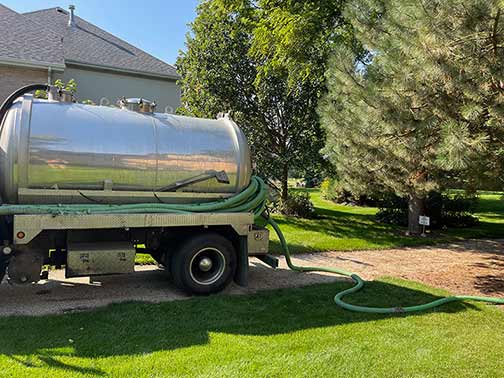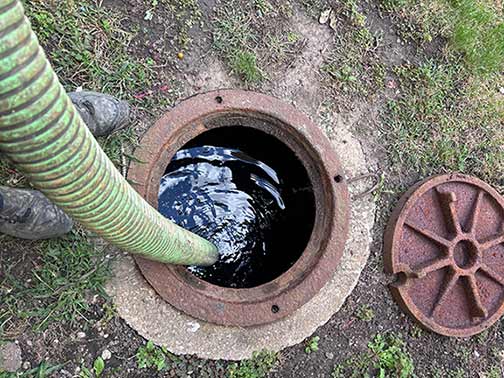The Importance of Pumping Your Septic Tank Before Fall: A Homeowner’s Step-by-Step Guide
As the vibrant hues of summer fade away and the crisp breezes of autumn begin to settle in, homeowners across the country start focusing their minds on preparing for the cold winter months to come. While winterizing the plumbing, sealing windows with caulk, and checking heating systems are generally at the top of the list, one extremely critical home upkeep section that far too frequently goes unnoticed is the health and effectiveness of your septic system.
Septic system maintenance regularly, particularly pumping your septic tank before the onset of the fall season, is not merely a routine chore but a vital proactive maintenance approach to ensure your home’s sanitation system well-maintained, efficient, and trouble-free during the cold weather. Below is a guide to highlighting the importance of septic tank pumping for every homeowner during before fall season, with a focus on the advantages, the hazards of doing without it, and some useful tips on how to keep your septic system running smoothly during winter.
Learning About Your Septic System’s Role in Your Home’s Ecosystem
Your septic system is an essential component of your home’s ecosystem, serving as a subsurface biological treatment plant that processes residential wastewater in an environmentally friendly manner. Comprising a drain field and septic tank, the system works to keep liquid and solid wastes separated; the solids settle at the bottom of the tank, where natural bacteria digest organic matter, and effluent or liquid waste seeps into the drain field to be filtered once more into the soil.
This process not only cleans your house but also keeps groundwater within the community from becoming polluted. Appreciate the vital role your septic system plays in a clean home and a healthy environment, and that’s why regular maintenance before the fall is crucial. A functioning septic system removes stinky smells, clogs, and potential health hazards, and your home becomes a haven and cozy living space for you and your family.
Why Pre-Fall Pumping of Your Septic Tank Is a Preemptive Move
Pre-fall pumping of your septic tank is a preventive, anticipatory strategy founded on the realities of maintenance and foresight. During the warmer months, your septic system will usually seem to work perfectly, generally bearing little signs of issues simmering just below the surface. However, as soon as temperatures begin to drop, biological activity within the tank slows down and the danger of system failure increases if the tank is near capacity. Pumping ensures your septic tank has ample space to store heavier volumes of effluent through the winter months, especially since freezing weather can cause the natural percolation and absorption of effluent into the soil to decrease.
Additionally, a clean, pumped tank reduces the risk of solids seeping into the drain field and clogging it and also costs to repair. Homeowners can prevent breakdowns such as overflows, backups, or system failures that can be enhanced by cold weather by having a pump installed ahead of fall. This proactive measure gives one peace of mind, with the assurance that your septic system is ready for seasonal changes without interruption or health risks.
The Risks of Not Pumping Septic Tank in the Fall
Not pumping your septic tank prior to the onset of fall has a snowball effect of serious problems that hurt both your health and property. With the declining temperatures and the ground beginning to freeze, the soil’s absorptive capacity is lowered, and it becomes more difficult for the effluent to disperse as required. An overfull or full septic tank also increases the likelihood of backups in the drain field or tank, leading to surfacing sewage in your yard or backup into your home’s plumbing fixtures. Additionally, when solids are allowed to flow into the drain field due to neglect, they will block the pores of the soil and render the system unusable, leading to expensive repairs or replacement altogether.
These failures not only pose serious health risks by contaminating groundwater with bacteria and pathogens but also come with significant expenses to homeowners. Emergency repairs, system replacement, and even legal recourse are all potential repercussions of neglecting regular maintenance. Pre-fall pumping is therefore a precaution—minimizing these risks and keeping your septic system healthy through the winter.
Indications Your Septic Tank Needs Pumping
While normal septic tank pumping is generally recommended every three to five years, there are certain indications that can signal your system needs to be worked on. The earliest indications of a full or failing tank will often be bad smells coming from the septic area or drains. Slow drain through the toilet, sink, or bathtub and gurgling sounds from the plumbing fixtures also mean that the tank is full or clogged.
Further, sewage backup in the house or effluent ponding on or around the drain field or septic tank are high-priority signs that your system needs professional pumping and inspection. Monthly inspections by a trained septic professional can help detect early warning signs so you can schedule maintenance before problems occur. Recognizing symptoms and moving fast can spare you money on repairs, avoid health hazards, and save you hassle, especially as winter approaches and the temperature falls.

How to Get Your Septic System Ready for Fall
Fall preparation is more than simply calling for a pump—you must implement an overall approach to get your septic system to stay accessible, functioning, and safe from destruction during winter. Start by having the septic tank made accessible for maintenance; remove debris, overgrowth, and obstructions near the tank to avoid obstruction during inspection or pumping. Avoid parking vehicles or placing heavy objects over the drain field, as excessive weight can compact the soil and damage the system.
It’s also crucial to be mindful of what goes into your septic system; refrain from flushing non-biodegradable items, chemicals, or excessive grease, as these can disrupt the natural bacterial processes vital for breaking down waste. Speaking with a septic expert on the optimal care measures prior to fall will ensure your system lasts longer, avoid unexpected emergencies, and get your septic system ready for winter challenges. Such preparation guarantees that your septic tank is in top condition, lowering the chances of freezing, backups, and expensive repairs over the cold season.
The Benefits of Regular Septic Tank Pumping
Regular and timely septic tank pumping has several benefits that extend way beyond short-term cost savings. To begin with, it helps prolong the life of your overall septic system, delaying expensive repairs or replacement. Frequent pumping also lessens the chances of system failure, backups, and overflows, which bring about extensive damage to the property and pose hazards to health. Additionally, a well-maintained septic system operates more efficiently, something which can equate to reduced water and energy costs, since the system won’t have to work so hard to decompose waste.
From an environmental perspective, routine pumping prevents sewage from seeping into ground water and thus degrades local ecosystems and community health. In addition, regular maintenance ensures compliance with neighborhood health codes, so homeowners won’t be fined or entangled in legal disputes. Ultimately, paying for regular septic tank pumping makes the home setting healthier, provides peace of mind, and makes property maintenance lasting.
Choosing a Professional Septic Service Provider
Partnering with a reputable, licensed septic service provider is essential for effective and reliable maintenance. When selecting a professional, look for providers with positive reviews, proper certifications, and transparent pricing structures. A qualified septic technician will conduct thorough inspections, assess the condition of your tank and drain field, and use appropriate equipment to perform efficient pumping. Regular service appointments, scheduled seasonally or as recommended, ensure that your septic system remains in optimal condition year-round.
Additionally, a good service provider will offer tailored advice on maintenance practices, environmentally friendly additives, and system upgrades if needed. Building a trusting relationship with a licensed professional not only ensures quality service but also provides peace of mind, knowing your septic system is in capable hands. Proper selection of a service provider is an investment in the longevity and reliability of your septic system, especially as you prepare for fall and the winter months.
Cost Elements and Budgeting for Septic Upkeep
While septic tank pumping does have a one-time cost, it is a prudent investment that will ultimately save homeowners a lot of money over the years. The average cost of pumping a septic tank generally ranges from $300 to $600, depending on tank size, location, and accessibility. Including routine septic upkeep in your home budget avoids breakdown repairs, which could cost thousands of dollars if left unattended.
Having a maintenance routine with your septic company allows you to budget and ensures your system receives prompt attention prior to seasonal fluctuations. Others opt to reserve a small monthly or yearly fund specifically for septic upkeep, thereby keeping costs more manageable without depleting resources. Proactiveness with respect to budgeting not only guarantees that your system continues to operate, but it also solidifies your commitment to prudent property ownership and the care of the environment.
Environmental and Health Advantages of Septic Maintenance
Proper maintenance of your septic system is a significant component of environmental and public health responsibility. Properly functioning septic tanks guarantee that untreated wastewater does not seep into adjacent water bodies, thereby protecting ecosystems, wildlife, and public health. Regular pumping reduces the risk of bacteria overpopulation and groundwater contamination, thereby waterborne diseases and health hazards to residents. By investing in routine maintenance, homeowners support the sustainability of the environment around them, minimize their carbon footprint, and aid in preserving natural resources.
Additionally, a properly working septic system minimizes foul odors, avoids messy backups, and ensures that your home waste is efficiently and safely processed. Making responsible septic care a part of your seasonal home maintenance is a form of environmental stewardship and commitment to community health, creating a safer, cleaner, and more sustainable environment for all to live.
Conclusion: Placing Septic Tank Pumping on a Seasonal Agenda
In conclusion, the importance of pumping your septic tank before fall cannot be overstressed. Doing so ahead of schedule saves your home’s sanitation system, prolongs its lifespan, and prevents expensive, trouble-prone repairs during the cold winter months. Knowing the vital role your septic system plays, being aware of the warning signs of a problem, and partnering with competent professionals for routine maintenance are all essential aspects of being a responsible homeowner. Making septic tank pumping an annual priority guarantees a reliable, efficient, and eco-friendly system serving your well-being, security, and peace of mind.
Making up this habit as part of your annual home maintenance routine not only benefits your property but also signifies your commitment to sustainability and public health. Ultimately, preventative septic upkeep is an investment in the longevity of your home and the well-being of your environment and is a wise and frugal decision for all property owners.


